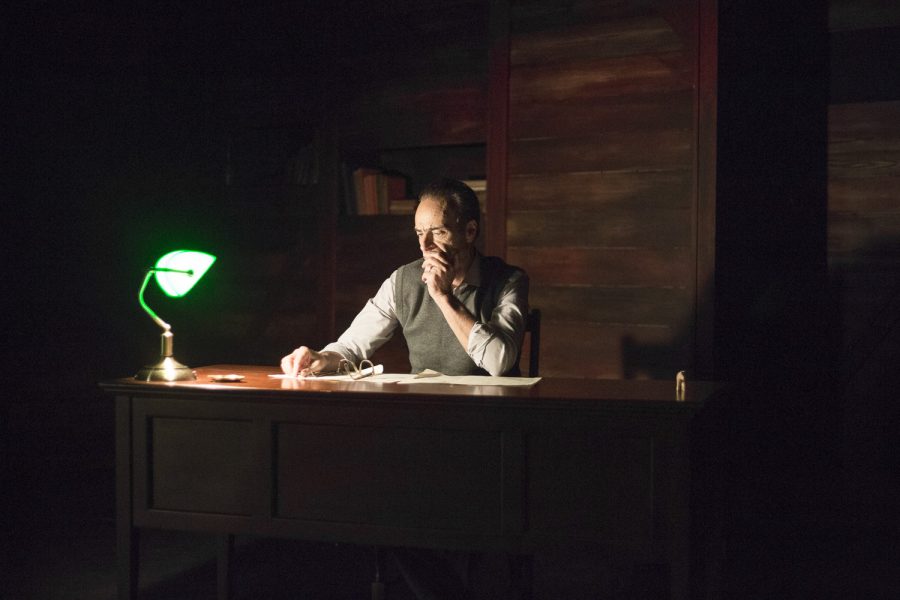Italian chemist and writer Primo Levi was a man known for sharing his Holocaust experiences. A survivor of Auschwitz, he went on to write a number of memoirs and stories related to his internment at the concentration camp. Yet, the Levi we meet in Geoffrey Williams’ Drowned or Saved? no longer wants to face such memories. In the intimate space of the Tristan Bates Theatre, we witness a man relive the trauma he has long tried to repress, looking for the closure he so desperately needs.
Confined to the dark, secluded space of his office, Levi is a prisoner of his own thoughts and memories of the war. Reliving some of his most painful experiences, a pensive Levi tries to find peace through his writing, as he pens an interaction between a dying prisoner and a fellow prisoner called Benjamin. Who Benjamin is, we never really know – he could be a projection of Levi’s own memories in the camp, a manifestation of all the other men and women imprisoned by the Nazis, or even pure fiction. Yet, Levi’s struggle to finish Benjamin’s story – his inability to discern whether those who died were victims or rather the ones saved by God – leads to the writer facing his own experiences head-on, along with the ghosts that populate them.
The phantoms of Levi’s past fill his office, even permeating the walls. The dimly lit, wood-panelled office resembles the cattle wagons that carted countless people to the concentration camps and, ultimately, their deaths. It feels paradoxical to describe the set as beautifully crafted given its symbolic nature, yet the subtly of Baśka Wesolowska’s design makes it an impressive feature.
There is an excellent variation of physicality brought by the cast to Williams’ play. While Marco Gambino poses a sleep-deprived and fragile Levi, life is injected into the space by Paula Cassina’s portrayal of Mrs Giordanino, the house maid. Wearing yet well-intentioned, Mrs Giordanino’s attempts to get Levi to leave his office further emphasise how much he has retreated into himself. The suffocating nature of his study is heightened by the heavy, laboured breathing of Null Achtzen (Eve Niker), which fills the entire theatre. Niker’s strained and exhausted prisoner is a haunting image that refuses to be overlooked, with Niker’s presence onstage at times feeling painfully prolonged.
There are thankfully some tender moments that bring warmth to the man frozen in time by memories of fellow prisoners succumbing to the harsh Auschwitz winters. The tension between Levi and his wife, Lucia (also played by Cassina), lead to the chemist reminiscing about how they first met; how eager she was to hear about his experiences, how she asked him whether he knew how to dance. The glow that accompanies these passing scenes underlines how much Levi’s mental state has deteriorated, as he struggles to now look his wife in the eye.
There are moments where some clarity or depth would have been appreciated: Why is Levi so reluctant to go and see his ailing mother? Are we meant to understand Alex Marchi’s character, Elijah, as Levi’s own prophet? It’s in the figure of Elijah that Drowned or Saved?’s intensity wavers a bit, with his descent “from above” feeling rather heavy-handed and unnecessary.
Still, for a 70-minute long performance, Williams’ work is a carefully composed piece of theatre that satisfyingly comes full circle. While the reality of Primo Levi’s depression and suspected suicide lingers as the play comes to a close, Drowned or Saved? attempts to offer solace to the man who spoke for a generation.
